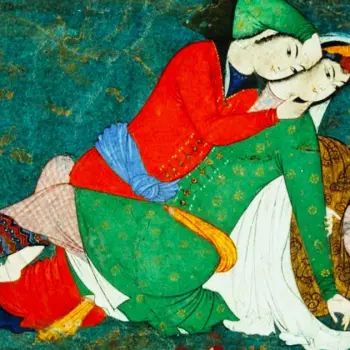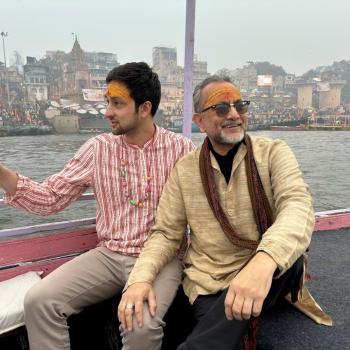 |
|
We’ll take it where we can get it
|
2006 was a year of many firsts and surprises. We celebrated the blessings of achievement, life, virtue, security, prosperity, righteousness, and truth-telling. Admittedly, we celebrated in the shadow of the hopeless, the despairing, the insecure, the poor & hungry, the self-destructive, and the truth-killers. But, silver linings do radiate from clouds, and the arc of the universe, as Dr. Martin Luther King, Jr. once said, bends to justice.
In 2006, we felt proud of prize-winners in peace and literature, the new Ibrahim Prize for governance, and the remarkable accomplishments of American converts. The Muslims of Russia showed us the sheer power of promoting virtue (modesty and patience among others) and abstaining from vice (especially alcohol).
We know Somalia as one of Africa’s poorest countries and one written off as a failed state. Yet, the Somalis demonstrated in a brief interval what could be accomplished when the rule of law prevailed without the corrosive effect of unjust taxation, regulation, corruption, warlords and World Bank dictums. China, the emerging global superpower, cemented ties with Africa, the planet’s poorest but potential-rich continent, with the promise of parity and partnership.
CNN and Fox News may have focused on effigy-burning crowds in Karachi and Cairo angry at journalistic and papal insults. But, there were ample instances of Muslims rising above the fray, repelling Quranically the bad around them with good action. Their efforts just didn’t earn much time on corporate news networks. Perhaps, these untold stories will garner more attention with the Internet’s continued spread and with al-Jazeera’s new world-wide English network, the first to be based in the global south.
We now present, in no particular order, the fifth annual edition of the Top Ten Muslim Good News Stories in the spirit of gratitude and humility, with hope for peaceful tomorrows. (See past year’s “Top Ten” lists for 2005, 2004, 2003, and 2002.)
1. Somalia tastes a moment of security and, yes, prosperity
For the first time in 15 years, you could walk safely and freely down the streets of Mogadishu, Somalia’s largest city, without fear, according to the New York Times, Washington Post, BBC, and Democracy Now. Mogadishu’s one million plus residents, accustomed to living in one of the world’s most dangerous cities, suddenly found themselves basking in the calm of safety. “Before, women were kidnapped, raped, killed and tortured,” said businesswoman Hakima Mohamud Abdi, 52, in late June. “Now we’ve seen a great change and we’re very satisfied.” That’s because Mogadishu’s thuggish warlords and their private armies were finally gone.
Defeating them was the Islamic Courts Union, a network of traditional courts supported by clans and the business community. ICU members had individually established law, order, and security since the late 1990s. Despite the specter of a very bloody conflict on the horizon, life in Mogadishu was intriguing and � compared to the warlording 1990s � fabulous.
With the taxation and corruption that accompanies modern, central governments gone (because the central government itself had vanished), Somali free enterprise and initiative thrived. The new order of law and security had boosted confidence, spurring a construction and business boom. Private schools and colleges opened. Mogadishu University celebrated two Somali firsts: a graduating class of nurses and the launch of an MBA program. Unlike most African countries, which usually have one badly-run government-owned airline, Mogadishu airport offered no less than six private airlines. Without telecom regulation, Somalia reportedly had the best phone and internet service in East Africa. Mogadishu had about a dozen internet caf�s. DHL provided international postal service. The ICU cleared Mogadishu’s streets of debris and trash, the first time that occurred in over a decade. The UN announced that Somalia had the highest rate of immunization since 1991. And, the full were feeding the hungry. With the deleterious hand of the World Bank absent, Somalia may have had the lowest rate of extreme poverty in Africa � no small feat. Moreover, despite long years of conflict, Somalia still has one of the lowest rates of AIDS in Africa.
Unfortunately, the international community led by the United States predictably acted to quash what they perceived to be a Taliban avatar and Al-Qaeda puppet in Somalia (a perception contributed to by the wayward activities of the ICU’s hotheaded youth wing). The ICU itself challenged that view in two letters to Washington. ICU leader Sharif Ahmed insisted to the New York Times that the Taliban was not his model and that, contrary to Western media reports of draconian ICU measures, the ICU supported World Cup soccer. “We are a Muslim people, we want to live in a peaceful way, we want to live with the rest of the world in a peaceful way,” Ahmed told the Times. “We are not terrorists and we do not associate with terrorists.”
Some Western voices called for engagement with the ICU. “It would be wrong,” Mario Raffaelli, the Italian special envoy to Somalia, told the Washington Post, “to target all [of the Islamic Courts Union] as extremists.” “The Islamists aren’t going away,” incoming House Subcommittee on Africa chairman Donald M. Payne (D-NJ), told the New York Times on December 14, “so the sooner we talk to them, the better.”
Instead, the last year saw Washington arming and funding Somalia’s terrorizing and narco-trafficking warlords (a page from the Afghan strategy book). ICU militiamen defeated the American-backed warlords in June. By December, American general John Abizaid green-lighted Ethiopia to invade Somalia as a proxy. Somalia’s brief, fascinating experiment in peace and prosperity, its Prague Spring, had come to a hasty end.
Note: the Ethiopian invasion of Somalia as we went to press forced us to change from the present tense to the past tense. Uncertainty and mayhem have unfortunately returned to much of Somalia.
2. Islam thrives as Russia’s population falls
A mosque on Moscow’s Red Square? Everyone from Vladimir Putin (who declared a national crisis) to that dean of Islamophobia, Daniel Pipes, expressed alarm this year about these two simple facts: since 1989, Russia’s Muslim population has jumped 40 percent to almost 25 million. At the same time, Russia’s overall population is plummeting at the rate of 700,000 to 800,000 people a year.
“Russia is going through a religious transformation that will be of even greater consequence for the international community than the collapse of the Soviet Union,” Paul Goble, an expert on Russian minority affairs, told the San Francisco Chronicle.
Russia’s Muslims aren’t going to take over any time soon. They still only comprise 10-15 percent of the total population, according to the CIA World Factbook (which claims that Russian Orthodox believers number only 15-20 percent). They remain a much-maligned minority, with the media and other centers of power in Russia constantly demonizing Islam. But demographers predict that by 2015, Muslim conscripts will make up a majority in the military. They also forecast that if current trends continue, people of Muslim descent will outnumber ethnic Russians.
The Times of London reported that continued Muslim population growth “has raised fears among Orthodox Church leaders and nationalists that Russia could eventually become a Muslim-majority nation.” A leading Russian sociologist, Viktor Perevedentsev, told the BBC that Russia’s total population could be halved by mid-century. However, he disagreed that Muslims would gain majority status, saying that politicians were merely exploiting the Muslim population increase.
While the reasons for Russia’s population implosion have been much discussed, little attention has focused on why Russia’s Muslims are thriving. To explain the overall decline, experts cite pandemic alcohol abuse, smoking, violent crime, abortions outnumbering births, the highest rate of HIV and TB infection outside sub-Saharan Africa, some of the worst industrial pollution anywhere, and perhaps the highest suicide rate in the world. Russian male life expectancy has dipped below 60 years, and is now lower than any South Asian country.
Muslims, not immune from Russia’s deadly morass, nevertheless seem to be immunized by their faith practice. Largely heeding the Prophet’s warning that alcohol contains the kernel of much evil, abstaining from unhealthy and risky sexual practices, and generally sustaining a culture of life, they have thrived. And, one day, they might just build that mosque on Red Square.
3. 2006: Year of the American Convert
What is it about converts? Some deride their zeal; others question their loyalty. The US government watches them closely (exhibit A: recently exonerated Oregon lawyer Brandon Mayfield), and their own families often have difficulty adapting to their family member’s new faith.
Over the past 30 years, America has witnessed one of the great mass conversions to Islam in history. A few million Americans, overwhelmingly Black, have embraced the Muslim faith. And, in the past year, the American Muslim community has more than ever turned to converts for visionary and trailblazing leadership. From comedians like Dave Chapelle and Preacher Moss, to authors like Shaykh Kabir Helminski and Michael Wolfe, converts � more than anyone else � are pushing the boundaries of what it means to be Muslim in America. 2006 was a year of many firsts for converts.
Minnesotan Keith Ellison became the first Muslim elected to the United States Congress. Ellison also became the first African-American Minnesota has sent to Congress. Ellison mobilized a motley crew of Somali immigrants, Muslims, Jews, and gays. He also got an endorsement from the local Jewish newspaper to boot. Ellison has since become a lightning rod for bigots fearful of democracy and pluralism, from CNN interviewers to a right-wing GOP congressman. But, Keith has shown ’em how its done: he won, and he has taken controversy in stride.
Dr. Ingrid Mattson, the energetic, articulate, and brilliant Hartford Seminary professor, assumed the reins of leadership at umbrella group Islamic Society of North America (ISNA). Mattson became the first convert, the first nonimmigrant, and the first woman Secretary-General of ISNA. The dynamic California-based duo of Imam Zaid Shakir and Shaykh Hamza Yusuf Hanson continued to publish, speak, and mentor. Shakir and Hanson have established their reputations as public intellectuals who happen to be Islamic theologians. On June 18th, they received front-page treatment in the New York Times. In the recent past, they have held high-profile public engagements with the likes of Cornel West, Chris Hedges, Noah Feldman and other leading American intellectuals. Finally, Dr. Umar Faruq Abdullah of the Nawawi Foundation – himself a convert – published “A Muslim in Victorian America,” a long overdue biography of pioneering American convert and Mark Twain pal Muhammad Alexander Russell Webb (Oxford University Press). Webb’s biography came on the heels of another important book explaining conversion and also from Oxford University Press, leading American Muslim convert-intellectual Dr. Sherman Jackson’s “Islam and the Blackamerican: Looking toward the Third Resurrection“.
4. China-Africa Summit: The dawn of Zheng He diplomacy?
Six hundred years ago Chinese Muslim explorer Zheng He explored the east coast of Africa. The first week of November saw Chinese officials repeatedly invoking Zheng He’s spirit of friendship and trade. That’s because Beijing welcomed representatives from 48 African nations including over 40 African heads of state. The China-Africa Summit was the largest diplomatic gathering ever hosted by China.
While critics remained wary of China’s intentions, supporters of the emerging relationship between African countries and the Asian economic giant said it was setting the stage for a new era of cooperation. “We are committed to improving the lives of people in Africa and China,” commented Chinese Foreign Minister Li Zhaoxing. Only five small African countries that have close ties to Taiwan did not participate.
China needs Africa, and Africa needs China. As China has become the factory to the world, the Chinese require Angolan and Sudanese oil for all the new cars on their streets. They need Zambian copper for all the electronic components they make. They have have rapidly growing energy, resource, and market needs. Africans need serious but non-exploitative partners to develop education, health, and infrastructure. Already, China-Africa trade has more than doubled since 2000, and analysts expect trade to top $50 billion dollars this year. While Western countries are slashing aid, China plans to double aid to Africa within the next three years.
The biggest deal to emerge from the summit promises to build a $8 billion dollar railway from Kano to Lagos in Nigeria. The 817-mile Nigerian north-south railway line will be China’s most expensive and ambitious foreign engineering project to date, according to the China Civil Engineering Construction Company.
Sierra Leone’s ambassador to China gave the China-Africa relationship this take to Granta magazine: “The Chinese are doing more than the G8 to make poverty history,” he said. “If a G8 country had wanted to rebuild the stadium, we’d still be holding meetings! The Chinese just come and do it. They don’t hold meetings about environmental impact assessment, human rights, bad governance and good governance. I’m not saying it’s right, just that Chinese investment is succeeding because they don’t set high benchmarks.”
We hope the China-Africa Summit heralds the dawn of a healthy global multilateralism and not merely a new age of exploitation.
5. Islamic Scholars speak out against FGM
Islamic scholars from around the world convened in Cairo to condemn Female Genital Mutilation (FGM) as practiced in numerous African and Asian countries. “Female genital mutilation contravenes the highest values of Islam and is therefore a punishable crime,” the final declaration read. The organizers, a Germany-based human rights group called Target, hoped that a Declaration by Ulema (theologians) on the issue would help to bring an end to the widespread practice, which is prevalent in only a few parts of the Muslim World and among other traditional communities, including the Copts of Egypt. Because FGM is so widespread and ingrained culturally, and so harmful to women as it is practiced today, the voices of religious authorities are an important means of ending FGM.
Hosted at Al-Azhar University, organizers billed the Cairo gathering “Eliminating the Violation of Women’s Bodies.” Those attending included Egyptian Grand Mufti Ali Jumaa, Grand Sheikh of Al-Azhar Mohammed Sayyid Tantawi, TeleSheikh Yusuf al-Qaradawi, and Sultan Ali Mirah Hanfary, leader of Ethiopia’s 3 million-strong Afar people.
The World Health Organization estimates that up to 140 million women around the world may have experienced FGM, and that two million women undergo FGM each year. UNICEF estimates that over 90 percent of women in the Horn of Africa (Ethiopia, Somalia, Sudan, and Djibouti) undergo FGM. In addition, experts estimate an equally high proportion of women in Egypt also endure FGM.
This latest effort to end FGM builds on recent developments. A previous Cairo declaration issued by governments and NGOs from 28 African and Arab countries in 2003 similarly called for the elimination of FGM. And, last year, the first lady of Djibouti Kadra Mahamoud helped to convene a regional Afro-Arab conference to reach a political and religious consensus on the elimination of FGM.
6. Al-Jazeera English launches
At 12:00 GMT on Wednesday the 15th of November 2006, a landmark event in the history of news-media occurred. The Anglo-American monopoly on world news finally got some serious competition. A global English language news and current affairs channel went live on the air from the Middle East, reaching over 80 million cable, satellite, and internet households. On its tenth birthday, Al-Jazeera began to beam its English language service across the planet. “Al-Jazeera aspires… to create a global channel with a target audience of the planet’s English speakers,” writes Alia Malek in the Columbia Journalism Review.
Funded by the Emir of Qatar, Al-Jazeera English (AJE) broadcasts from centers in Malaysia, the Persian Gulf, the UK, and the US. Unlike its two main competitors CNN International and BBC World, AJE seeks to deliberately report “from the South to the North.” The channel says its mission is to “set the news agenda, bridging cultures and providing a unique grassroots perspective.”
Unfortunately, the northern audience that needs it most � the American market � can only access the channel via the Internet or a special receiver from GlobeCast World TV. Not a single US cable or satellite provider has agreed to host the channel. Even Israelis can watch AJE with ease. While US cable and satellite providers are imposing an AJE blackout on their viewers, UPI reported that the Pentagon makes AJE available to its employees on closed-circuit Pentagon TV.
With news teams deployed in 20 countries augmented by 60 news bureaux, AJE intends to feed the global news system with unprecedented coverage from Asia, the Middle East, Africa, and Latin America.
7. Miss Muslim “inner” beauty pageant in Tatarstan
There were no swimsuits at the first-ever “Miss Muslim” competition in Tatarstan. Instead, organizers hoped there would be plenty of brains on display at this “inner” beauty pageant.
The judges crowned 17 year-old Dilar Sadiqova as Miss Muslim 2006. “I decided to take part in the competition to convey the message that you can be a Muslim and still do whatever you want as long as it is moral and respectable,” Sadiqova told reporters.
Keen to recognize the talents of young Muslim women, a group of activists decided to put a twist on that exploitative and demeaning symbol of pop culture � the beauty pageant. They wanted to do something constructive, creative and attention-getting. So they staged the first annual “Miss Muslim” talent contest. (Think of it as American Idol minus the immodesty and indecency.) “We want to show,” head judge Saida Abukofa told IslamOnline, “that beauty has nothing to do with nudity and obscenity.”
An all-female audience cheered on contestants in the Celebrations Hall of the recently-completed Grand Mosque in Kazan, the historic Tatar capital located on the Volga River about 400 miles from Moscow. Tatarstan is an autonomous region within the Russian Federation. Muslims account for over sixty percent of Tatarstan’s population of four million.
Can Islam offer a compelling positive vision of femininity and womanhood for today’s world? Organizers of this novel pageant in an eastern European land think so.
8. Dialoguing with the Dalai Lama, penpal-ing the Pope
Muslim spiritual leaders responded to crisis as the Quran counsels � they repelled bad with good. To that end, the global Muslim community engaged the Dalai Lama for the first time at a San Francisco summit in the effort to address religious extremism in the world. And, 38 leading Muslim religious scholars and leaders from all eight schools of thought and jurisprudence sent an open letter – unprecedented in the history of Muslim-Catholic relations – to Pope Benedict XVI on Oct. 12, 2006.
The extraordinary Buddhist-Muslim summit that took place in April in San Francisco brought together the Dalai Lama, Shaykh Hamza Yusuf, and a remarkable group of prominent Buddhists and Muslims. The convening, called “The Gathering of Hearts Illuminating Compassion,” generated quite a bit of publicity, with stories appearing in The New York Times and on Al-Jazeera.
“Personally, I can tell you that in Tibet Buddhists and Muslims have lived together for more than four centuries,” the Dalai Lama said. “Very gentle, very peaceful; no reports of quarrels.”
“The Dalai Lama’s historic gesture of solidarity with his Muslim brothers and sisters will resonate throughout the world,” remarked Shaykh Hamza Yusuf. “This meeting was a reaffirmation of and a commitment to using the wisdom of our traditions as a means to help one another overcome suffering through the core teaching of compassion, and to condemn the perversion of religion that causes so much human suffering. This unifies us all.” Perhaps the world’s best-known Buddhist leader, the Dalai Lama has been the spiritual and temporal leader of the Tibetan people since he was a teenager in the 1950s.
In the 1950s, Pope Benedict was still Joseph Alois Ratzinger, a newly minted Bavarian priest completing his studies. Perhaps, he was reflecting then on his wartime experience in Nazi Germany. Ratzinger joined the Hitler Youth at age 14, then served in a Nazi anti-aircraft unit guarding a BMW factory in which slaves from Dachau toiled, and later watched Jews being herded into death camps in Hungary. He said “resistance was impossible” to Nazi rule, although his neighbor went to Dachau as a Conscientious Objector.
Demonizing or denigrating Islam and Muslims, on the other hand, has come quite easily to the new Pope. His now infamous Regensburg speech with its clever embedded 14th century quote, which he delivered on the telling date of September 12, provoked quite a bit of media-generated outrage and a few very unfortunate acts of violence.
The most significant response came from over three dozen of the top Muslim scholars of our time, who composed a very sane and reasonable response letter to the Pontiff. The letter effort was coordinated by Islamica Magazine, which has set the standard in recent years for intelligent writing and stunning graphic design among Muslim publications. Unfortunately, the letter received sparse coverage.
Christianity and Islam make up more than half of humankind in an increasingly interconnected world, the letter stated, and it is imperative that both sides move towards a frank and sincere dialogue of hearts and minds which furthers mutual understanding and respect between the two religious traditions.
9. Small breakthroughs in Muslim-Jewish relations, Palestine struggle
This summer, depressing news of Israeli Prime Minister Ehud Olmert’s rapacious assault on Lebanon filled the airwaves. The hullabaloo over Iranian president Mahmoud Ahmadinejad’s Holocaust denial antics rose to a deafening din. Finally, it was difficult as we went to press to determine whether newly minted megastar Sasha Baron Cohen aka Borat Sagdiyev was a net positive or negative for Muslim-Jewish relations. Mainstream media consumers would be hard-pressed to know that progress was actually made in Muslim-Jewish relations and in the struggle for a free Palestine.
What we haven’t heard enough about:
- 120 Imams & Rabbis from 31 countries and four continents who gathered in Seville, Spain. In addition to chatting it up, they committed to working on joint projects, such as the protection of sites in the Holy Land.
- Palestinian-American activist Ali Abunimah’s new book “One Country” (Metropolitan Books), which outlines in detail how true peace and reconciliation could be achieved between the Jordan River and the sea.
- The affirmation of the Israel-Palestine conflict’s centrality to the region by the Iraq Study Group, a blue-ribbon bipartisan panel of American establishmentarians.
- Working Paper Number RWP06-011, the policy paper by John Mearsheimer and Stephen Walt, which made the earth-shattering though important public claim that “the centerpiece of US Middle East policy is its intimate relationship with Israel… due primarily to the activities of the ‘Israel Lobby’.” The paper was published on the website of Harvard University’s Kennedy School of Government. Academics at elite institutions, Mearsheimer and Walt were savaged by anti-peace watchdogs like Alan Dershowitz, who claimed that the Saudi lobby was more powerful than the Israeli lobby. (Yeah right, Alan.)
- Former US President Jimmy Carter highlighting Palestinian suffering in a welcome book entitled “Palestine: Peace Not Apartheid” (Simon & Shuster) for which Carter has received the full Alan Dershowitz treatment.
- Holocaust awareness efforts are held by Muslims. Young Muslim Londoners who comprise City Circle kicked off their annual lecture series by hosting Roman Halter, a Holocaust survivor. The event came in the wake of controversy surrounding Holocaust Memorial day in the UK. City Circle has previously hosted Rabbi Jonathan Wittenberg to talk about genocide with Mufti Barkatulla. American Muslim activists visited the Holocaust Museum in Washington, DC with survivor Johanna Neumann, who credits her survival to an Albanian Muslim family. Audiences in California flocked to Holocaust survivor Annette Herskovitz’s talks about the role of Muslims in rescuing Jewish children in wartime Paris.
- Nobel laureate Desmond Tutu leverages his moral authority with regard to Palestine. Tutu agreed to lead a fact-finding mission to investigate Israeli military operations in Gaza, after 19 Palestinian civilians were slain in a single massacre in November. “This is a time in our history that neither allows for indifference to the plight of those suffering,” Tutu told reporters in Geneva after Israel refused him a visa, “nor a refusal to search for a solution to the present crisis in the region.”
- The play My Name is Rachel Corrie is based on slain human rights activist Rachel Corrie’s experiences. Initially cancelled due to specious reasons, the play finally showed in New York and London.
- The World Ethnic Market trade show in California, which paired Kosher and Halal products for the first time under one roof in an American trade show. The show followed a successful previous one in the UK. “The halal market in the US is the little brother to the kosher market and has a lot to learn,” Jalel Aossey of Cedar Rapids, Iowa-based halal food processor Midamar Corp, told the Los Angeles Times. “I wondered if this would work, but food is a good way for people to come together.”
10. To help Africa, Sudanese billionaire creates an innovative incentive
Visionary Mohamed Ibrahim believes good governance is the key to development in Africa. He should know: Ibrahim is one of Africa’s most successful business leaders. Born in Sudan, Ibrahim in 1998 founded Celtel International, an African mobile telephone company that he sold in 2005 to a Kuwaiti company for $3.4 billion. A wireless pioneer who helped developed the world’s first cell phone network in 1984, Ibrahim says he built Celtel without ever paying a bribe. Now he says he wants to change the way Africans govern.
The London-based Sudanese billionaire just put his money where his mouth is. In October, he launched the world’s biggest prize: The Mohamed Ibrahim Prize for Achievement in African Leadership. The cash prize is essentially a waqf for ushering in the African renaissance. Ibrahim hopes to recognize and reward those leaders who strengthen democracy, the rule of law, the provision of health and educational facilities, and an empowered civil society.
Ibrahim envisions no ordinary prize. Dwarfing the Nobel Prize in amount, The Ibrahim Prize will shell out $5 million over 10 years and $200,000 annually for life thereafter. The eligible recipients are former executive Heads of State or Government in sub-Saharan Africa. The Ibrahim Index for African Governance will assist the prize committee in their annual decision. The Ibrahim Index, newly developed by Robert Rotberg at Harvard University, ranks the performance of sub-Saharan African governments. The Foundation plans to announce the first winner in 2007.
Mas’ood Cajee is a journalist who lives in San Joaquin County, California. He can be reached at .(JavaScript must be enabled to view this email address)
//’;l[1]=’a’;l[2]=’/’;l[3]=”;l[21]=’\”‘;l[22]=’ 109′;l[23]=’ 111′;l[24]=’ 99′;l[25]=’ 46′;l[26]=’ 111′;l[27]=’ 111′;l[28]=’ 104′;l[29]=’ 97′;l[30]=’ 121′;l[31]=’ 64′;l[32]=’ 101′;l[33]=’ 101′;l[34]=’ 106′;l[35]=’ 97′;l[36]=’ 99′;l[37]=’ 109′;l[38]=’:’;l[39]=’o’;l[40]=’t’;l[41]=’l’;l[42]=’i’;l[43]=’a’;l[44]=’m’;l[45]=’\”‘;l[46]=’=’;l[47]=’f’;l[48]=’e’;l[49]=’r’;l[50]=’h’;l[51]=’a ‘;l[52]=’= 0; i=i-1){
if (l[i].substring(0, 1) == ‘ ‘) output += “&#”+unescape(l[i].substring(1))+”;”;
else output += unescape(l[i]);
}
document.getElementById(‘eeEncEmail_tdRS9xw1Iv’).innerHTML = output;
//]]>















